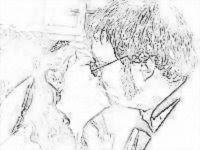When Jesus had spoken these words, he went out with his disciples across the Kidron Valley, where there was a garden, which he and his disciples entered. Now Judas, who betrayed him, also knew the place, for Jesus often met there with his disciples. So Judas, having procured a band of soldiers and some officers from the chief priests and the Pharisees, went there with lanterns and torches and weapons. Then Jesus, knowing all that would happen to him, came forward and said to them,
"Whom do you seek?" They answered him, "Jesus of Nazareth." Jesus said to them,
"I am he." Judas, who betrayed him, was standing with them. When Jesus said to them,
"I am he," they drew back and fell to the ground. So he asked them again,
"Whom do you seek?" And they said, "Jesus of Nazareth." Jesus answered,
"I told you that I am he. So, if you seek me, let these men go." This was to fulfill the word that he had spoken:
"Of those whom you gave me I have lost not one." Then Simon Peter, having a sword, drew it and struck the high priest's servant and cut off his right ear. (The servant's name was Malchus.) So Jesus said to Peter,
"Put your sword into its sheath; shall I not drink the cup that the Father has given me?"
----
So they took Jesus, and he went out, bearing his own cross, to the place called the place of a skull, which in Aramaic is called Golgotha. There they crucified him, and with him two others, one on either side, and Jesus between them. Pilate also wrote an inscription and put it on the cross. It read, "Jesus of Nazareth, the King of the Jews." Many of the Jews read this inscription, for the place where Jesus was crucified was near the city, and it was written in Aramaic, in Latin, and in Greek. So the chief priests of the Jews said to Pilate, "Do not write, 'The King of the Jews,' but rather, 'This man said, I am King of the Jews.'" Pilate answered, "What I have written I have written."
----
After this, Jesus, knowing that all was now finished, said (to fulfill the Scripture),
"I thirst." A jar full of sour wine stood there, so they put a sponge full of the sour wine on a hyssop branch and held it to his mouth. When Jesus had received the sour wine, he said,
"It is finished," and he bowed his head and gave up his spirit.
Since it was the day of Preparation, and so that the bodies would not remain on the cross on the Sabbath (for that Sabbath was a high day), the Jews asked Pilate that their legs might be broken and that they might be taken away. So the soldiers came and broke the legs of the first, and of the other who had been crucified with him. But when they came to Jesus and saw that he was already dead, they did not break his legs. But one of the soldiers pierced his side with a spear, and at once there came out blood and water. He who saw it has borne witness--his testimony is true, and he knows that he is telling the truth--that you also may believe. For these things took place that the Scripture might be fulfilled: "Not one of his bones will be broken." And again another Scripture says, "They will look on him whom they have pierced."
After these things Joseph of Arimathea, who was a disciple of Jesus, but secretly for fear of the Jews, asked Pilate that he might take away the body of Jesus, and Pilate gave him permission. So he came and took away his body. Nicodemus also, who earlier had come to Jesus by night, came bringing a mixture of myrrh and aloes, about seventy-five pounds in weight. So they took the body of Jesus and bound it in linen cloths with the spices, as is the burial custom of the Jews. Now in the place where he was crucified there was a garden, and in the garden a new tomb in which no one had yet been laid. So because of the Jewish day of Preparation, since the tomb was close at hand, they laid Jesus there.
--portions of the gospel of john, chapters 18-19

No comments:
Post a Comment